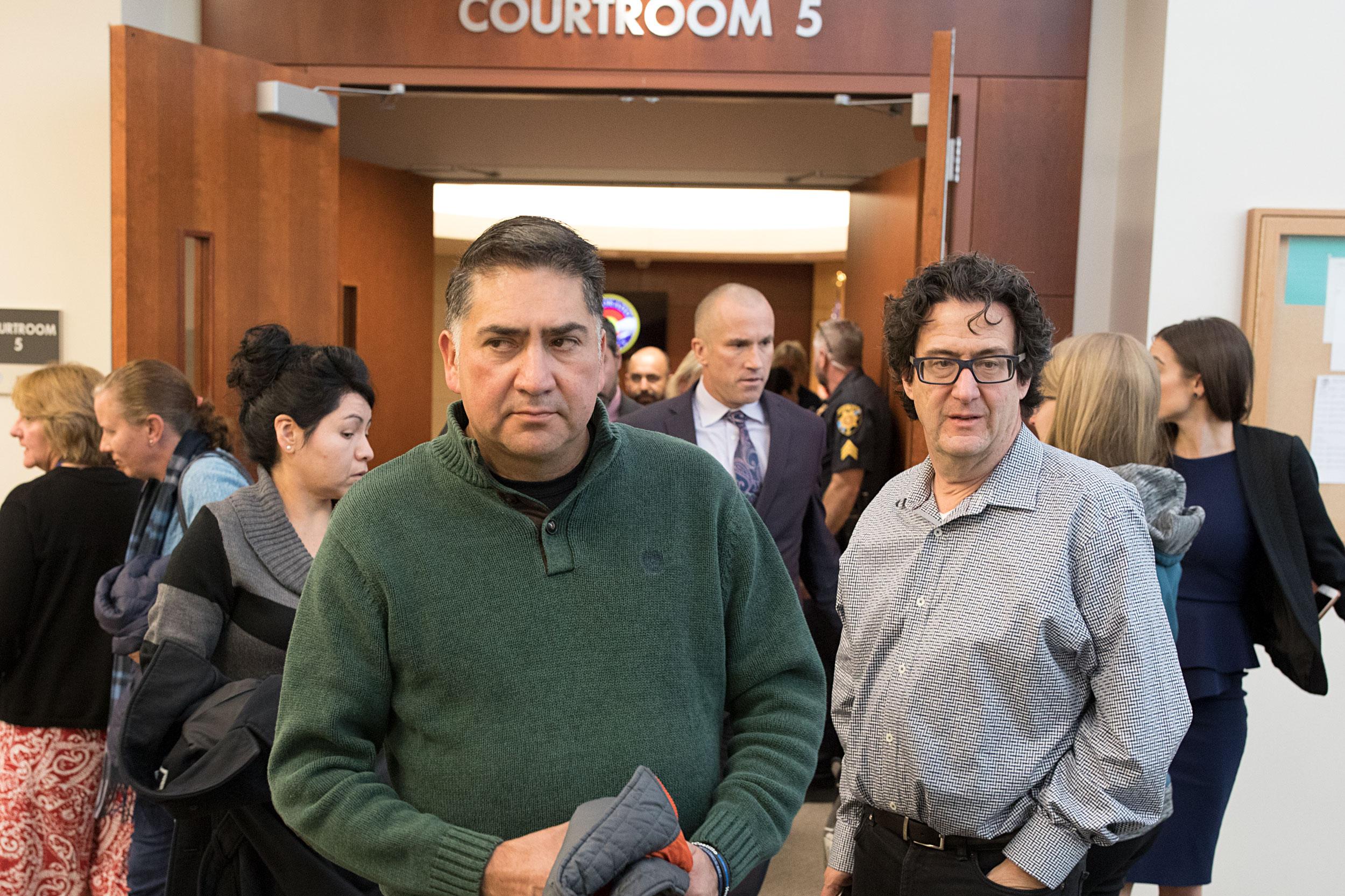
Alec McKinney, the younger of the two shooters charged in the STEM School shooting in May 2019, was sentenced to life in prison with the possibility of parole for his role in the attack.
One student, Kendrick Castillo, was killed in the shooting and eight others were injured.
John and Maria Castillo, Kendrick’s parents, on Friday told Judge Jeffrey Holmes that McKinney was a “monster” and deserved the maximum sentence.
“You took something from me that can never be replaced,” John Castillo said, crying. “As a father, my only purpose in life was to provide for my family … You planned and orchestrated terror and murder … You took all of that away. I hear people say ‘I hope you find peace.’ I don’t. I’ll never find peace.”
Maria Castillo sobbed on the stand and screamed, “Coward! He doesn’t deserve the air he’s breathing!”
Addressing the victims, McKinney, who was 16 during the shooting and is 17 years old now, apologized and tearfully vowed to change. He had never addressed the court before.
“I don’t want you to ever think Kendrick died in vain,” McKinney said, speaking directly to the Castillos. “Every day I wake up and try to do something positive. I don't do it for me, I do it for Kendrick … I promise to live my life as a new person.”
McKinney also addressed would-be school shooters. He said he’d gotten “fan mail” inside juvenile detention.
“How can you idolize someone who hurt people? Someone who is so weak that they couldn’t get help?” he said. “This is to anyone who is thinking about a school shooting: get help now. Don’t be a coward and hide behind a gun. Be brave and learn how to get help. Face what you’re feeling. Think about what you’re caring about because it hurts them way more than you’ve ever been hurt.”
Throughout the hours of gripping testimony, much of which was conducted over the internet, McKinney looked straight into the camera and openly wept. He wasn’t physically in the courtroom, but remained in a juvenile detention facility with his lawyers due to coronavirus precautions.
More than a dozen former students, parents of students, teachers and friends of McKinney testified that the May 7, 2019 shooting has devastated their lives.
Survivors of the shooting in the British Literature classroom that day say they suffer post-traumatic stress disorder, can’t sleep and haven’t been able to move on from the event — even now that some of them are in college.
“At night, I wake up after a nightmare and I can’t move because I don’t know if you’re outside waiting with a gun,” said STEM student Aiden Morrison, who is still a student at the school. “It makes my life terribly difficult to live. You didn’t only shoot innocent kids in this school but you scarred others. You should be ashamed of yourself. Not only did you damage me and countless others, but you murdered Kendrick.”
Gabriela Leddy was teaching in the room next door during the shooting. She tearfully told the judge that McKinney was one of her favorite students.
“I found him funny, charming, witty and always friendly towards me,” she said. “This is a heartless attack that spit in the face of the kindness of teachers like me. This attack felt personal to me. I cared for Alec. I tried to work with him to get his assignments in. I tried to help him with his emotional and academic difficulties.”
How much time McKinney will ultimately serve is still in question because of a new state law that allows juveniles to be paroled after serving only 25 years if they successfully complete an extensive program in prison, said Vikki Migoya, a spokeswoman for District Attorney George Brauchler. The law is the product of a US Supreme Court ruling that declared it unconstitutional to sentence people to life without parole for crimes committed before they are 18 years old.
Migoya said the program has not been used yet since the state law is so new, so it’s unclear how it would work in this case.
Judge Holmes, before sentencing McKinney, called his crimes “excessive.”
“It is an unimaginable series of violations of individuals’ physical, emotional, mental security,” he said.
McKinney was born biologically female and was transitioning to male at the time of the shooting. Where he will be housed as a transgender teenager is still unclear and the state’s Department of Corrections said on Friday officials will do an evaluation when he is transferred into DOC custody.
His friend and co-defendant Devon Erickson faces murder charges for his role in the shooting. He was 18 at the time of the attack and pleaded not guilty for his role in the case. His trial is scheduled for this fall.
McKinney’s mother, Morgan McKinney, took the stand ahead of her son’s sentencing and apologized for his actions. During an earlier court proceeding, McKinney testified that her son was a product of child abuse and mental illness.
“I know my apologies may not mean much to you,” she said, speaking directly to a room full of STEM students and their parents. “I know I’m not perfect. I’m not a perfect parent … I am certainly sorry for this tragic tragedy.”
Looking directly at the Castillos, Morgan McKinney said, “mostly for you and the loss of your child, I know it’s quite different but I’ve lost mine too.”









